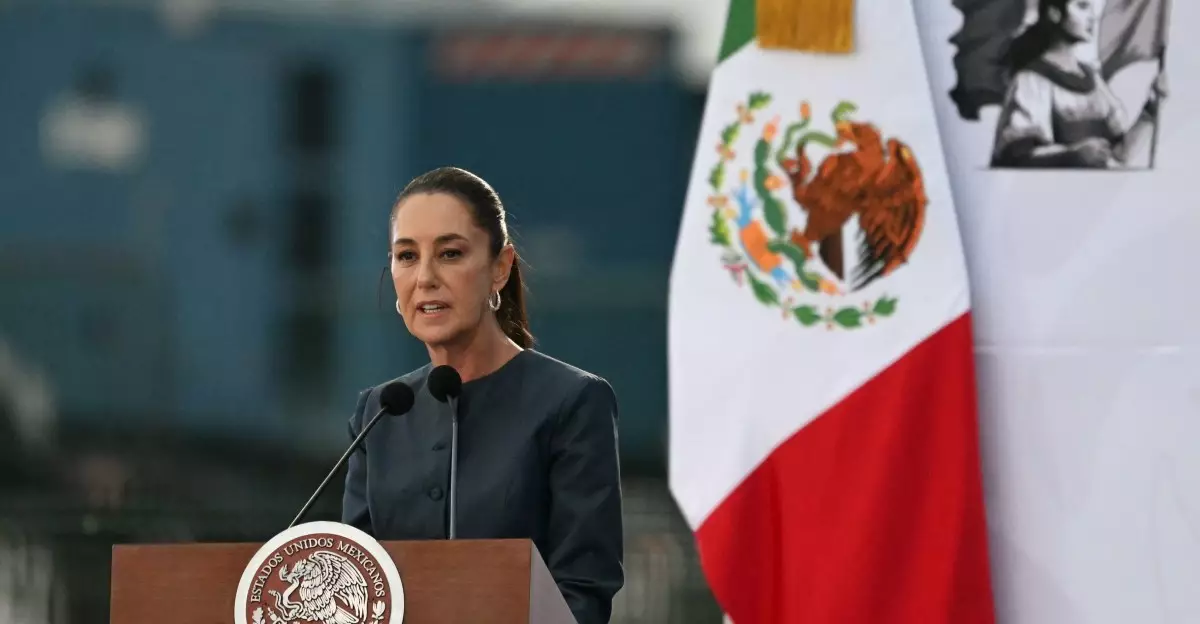In an era marked by increasing global interdependence, identity and sovereignty remain fiercely contested grounds. Mexican President Claudia Sheinbaum recently reignited tensions over geographical nomenclature, wading into the complexities of international relations, national identity, and big tech’s influence. The crux of the controversy is Donald Trump’s administration’s attempt to rebrand the Gulf of Mexico as the “Gulf of America” within American digital monopolies like Google Maps. This issue encapsulates more than just semantics; it reflects a broader struggle over cultural identity and historical recognition.
Sheinbaum’s government has embarked on a legal journey against Google, filing a lawsuit for its compliance with the Trump-era decree that changed the name of this significant body of water in American digital spaces. This confrontation is emblematic of Mexico’s collective response to what it sees as an affront to its sovereignty. By asserting that the Trump administration cannot unilaterally dictate the nomenclature of an international gulf, Sheinbaum invokes the principles of international law which dictate that bodies of water transcending national borders belong to the collective understanding of all countries with coastlines along them.
A Symbol of Sovereignty
It is crucial to understand that this dispute is rooted in a deep-seated sense of national pride and sovereignty. The Gulf of Mexico is not merely a geographical feature; it is interwoven with the culture, economy, and history of Mexico. In her emphatic declarations, Sheinbaum makes it clear that while the United States can refer to parts of the Gulf as it sees fit, any alteration of names pertaining to areas under Mexican jurisdiction is unacceptable. This legal action reflects the Mexican government’s duty to protect its territorial integrity against what it perceives as cultural imperialism.
Moreover, Sheinbaum’s remarks emphasize a critical principle: the importance of mutual respect among nations. When leaders such as Trump overlook the historical and geographical nuances of a shared resource, they risk inflaming historical grievances that can lead to more significant geopolitical tensions. This struggle for the integrity of nomenclature thus serves as a microcosm of larger issues surrounding cultural appropriation, historical revisionism, and the respect nations owe one another within the international community.
The Role of Technology in Name Change Politics
The complicity of technology companies like Google further complicates this matter. By implementing the name change within its Maps service, Google has effectively acted as a digital gatekeeper, reinforcing the political narrative propagated by the Trump administration. Sheinbaum’s government has accused Google of overstepping its bounds as a corporate entity and urged it to adhere to a more culturally sensitive approach that acknowledges the implications of its data representation.
This lawsuit raises essential questions about the responsibilities of tech companies in the political sphere. As organizations that shape public perception through their platforms, tech entities must grapple with their influence on cultural narratives. The fact that changes made by these companies can reverberate across borders illustrates the profound impact of digital regulation on international relations and highlights the need for corporations to act ethically and thoughtfully in politically charged environments.
The Cultural Response to Geographical Renaming
As fervent as the legal discourse may be, the cultural response is also telling. Mexican society has rallied behind this challenge to Trump’s nomenclature decree, viewing it as a symbol of broader resistance against the perceived imperialism of American policy. From social media campaigns to public demonstrations, the renaming of the Gulf has awakened a renewed sense of nationalism that speaks to deeper historical contexts—namely, Mexico’s battle to maintain its identity in a territory once claimed and dominated by its northern neighbor.
Furthermore, companies like MapQuest, which have resisted the name change, present an interesting counter-narrative. Their decision to maintain the traditional designation of Gulf of Mexico is not merely a corporate choice but also a bold statement against a culture of compliance within the tech industry. It underscores the idea that corporate responsibility extends beyond profit margins and includes a moral obligation to uphold historical and geographical accuracy.
The legal actions propelled by President Sheinbaum and the cultural fervor they have ignited transcend mere semantics; they represent a crucial assertion of identity and autonomy in a world where the power to name is closely tied to the power to define. The implications of this battle extend far beyond the Gulf, touching upon the very essence of national pride, historical recognition, and the complex interplay of technology and political authority.


Leave a Reply